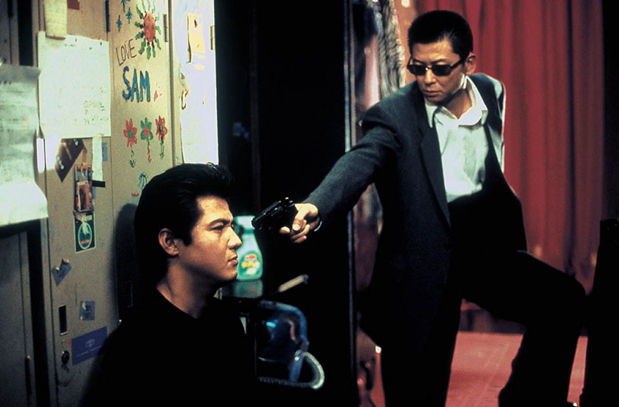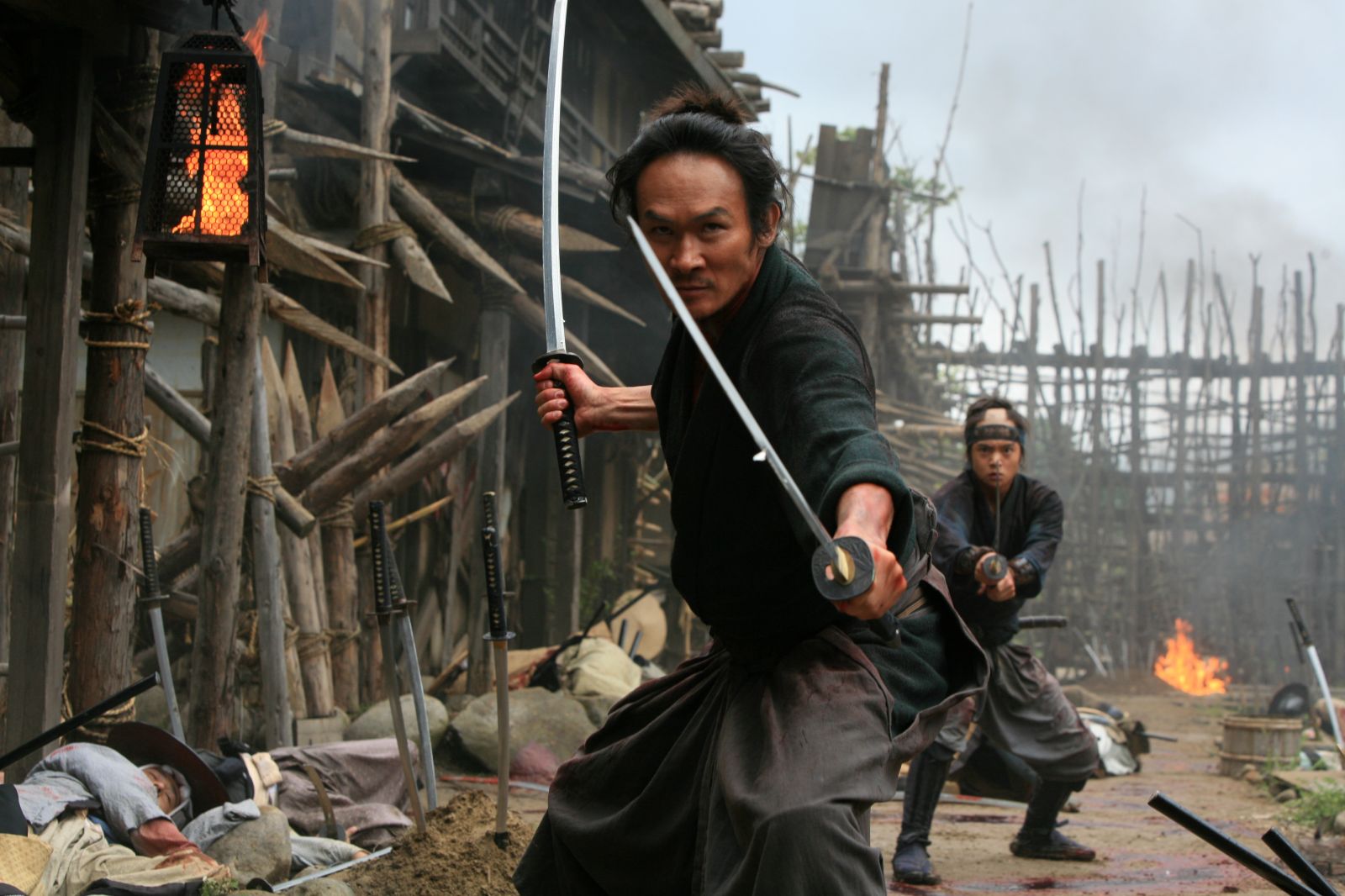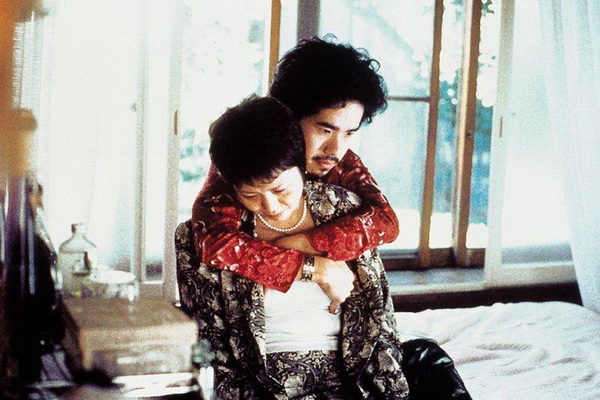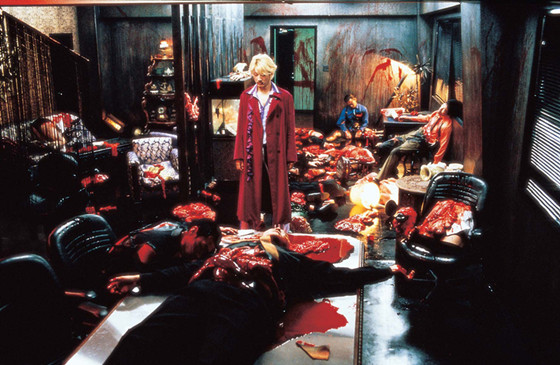5. Dead or Alive (1999)
Whilst 2001 might have been the year that Takashi Miike really killed it, he certainly was warming up as early as 1999 when he also directed seven films, including this title as well as the number one entry on this list. Dead or Alive would be the first entry in its own trilogy, which consists of three very different types of movies, all featuring the same two lead actors playing different yet always opposing characters. The opening film in the series is the most renowned one, although fans of Miike are also advised to make sure to see the second entry in the series, which has a totally different tone to this first instalment.
Dead or Alive is an insane yakuza action film featuring Shô Aikawa and Riki Takeuchi, both Miike regulars. Aikawa plays detective Jojima, a Japanese narcotics cop, whose dedication to his work has resulted in having a neglected wife he no longer sleeps with and a sick daughter who is in desperate need of an operation at home.
Takeuchi on the other hand is a bad-ass Chinese-born yakuza named Ryuichi, who is trying to take control over Shinjuku quarter in Tokyo by muscling his way into a major Taiwanese drug deal. Part of the reason for him doing so is that he is trying to support his innocent younger brother’s efforts to go study in the US. As Jojima tries to bring down Ryuichi, both men lose all that’s dear to them and start heading on a collision course with disastrous results.
Perverted, violent and extremely high-octane, Dead or Alive is a true rollercoaster ride through the seemingly insane brain of Takashi Miike. Even if this movie is not your type of thing, one would still be wise to at the very least check out the film’s ten minute opening sequence. It’s one of the most kinetic and frantic montages to ever have opened a film, which has to be seen to be believed.
It basically serves as a perfect crash course in exemplifying what makes Miike such a unique and exciting director. Dead or Alive is Miike at his surreal and perverted best and pure yakuza madness bliss. Just like The Happiness of the Katakuris, this film is a truly unique piece of work which refuses qualification and ranks amongst Miike’s all time classics.
4. 13 Assassins (2010)
Another more recent film, which is also a remake that plays it fairly straight although it certainly contains some particularly nasty and sadistic scenes, which clearly give away that we are dealing with a Miike film here, 13 Assassins is an action-packed samurai period drama. The film and its follow-up, Hara-Kiri: Death of a Samurai, briefly gave the impression that Miike might actually be making a move to turn to more “serious” filmmaking as he reached the age of fifty but his output since has put these suspicions firmly to rest. What these two movies did manage to do is confirm that the man simply refuses to be categorised.
Lord Matsudaira Naritsugu is the sadistic half-brother of the shogun, who takes great pleasure in killing, raping and torturing innocent common people at will. The shogun’s justice minister realises that things will truly get out of hand if Matsudaira would gain further power and decides to have him assassinated, which will prove a difficult task as the man is constantly surrounded by many bodyguards. He enlists the help of honourable samurai Shinzaemon who gathers a team of 11 more samurai around him to complete the task.
Realising that the odds are against them, Shinzaemon decides to lay a trap in a small village but en route to the village they are attacked as their mission has been betrayed. The group manages to escape but gets lost in mountains where they encounter a lonely hunter, who helps them back on track and ends up becoming the thirteenth member of the group. Once at the village they turn the town into one large booby-trapped maze and await the arrival of the feared lord and his forces.
I might get myself in hot water here by simply mentioning a Miike film in the same breath as an Akira Kurosawa one, but I can not deny that whilst seeing this film, I couldn’t help but get as excited as when I first saw The Seven Samurai as a kid. The surface similarities between both movies are obvious and whilst this movie clearly can’t be in the same league as the Kurosawa masterpiece, the second half of the film in which the 13 assassins fight off an overwhelming army of 200 bodyguards in a small village is gripping, visceral and exciting stuff, which had me on the edge of my seat. A must-see for all fans of samurai films, Miike fans and those who love a good movie about a small group of righteous men fighting evil against overwhelming odds.
3. Visitor Q (2001)
Possibly my personal favourite Takashi Miike film, I felt couldn’t get away with putting Visitor Q on the number one spot in this list. First of all because this is a (purposefully) cheap looking, shot on digital video, straight-to-video feature. Secondly because it felt more logical to give the top two spots on this list to two films which really gave Miike his international breakthrough and provided him with an international following. And lastly because this film does true justice to the sentiment “certainly not for everybody” as it might feature some of the greatest perversions and taboos in any Miike film. And considering the director’s reputation that statement shouldn’t be taken lightly.
Made in Miike’s golden 2001 year, Visitor Q deals with a severely dysfunctional family. And when I say severely dysfunctional, I am not exaggerating. The father is a documentary filmmaker who is all to happy to use his son, who is incessantly bullied, as his subject for his documentary on troubled youth and to pay his daughter, who has turned to prostitution, for sex. The mother suffers constant physical abuse from her son and has a heroin habit, which she finances by being a dominatrix.
The son is the constant target of bullying and in turn takes it out on his mother, whilst the daughter has ran away and is making her living as a prostitute. But all is about to change when Visitor Q makes his appearance in the household, who with his very peculiar ways will try to turn this family into a harmonious unit again.
Best described as Miike’s take on Pier Paolo Pasolini’s Teorema, Visitor Q is a very, very dark comedic drama that at times might be awfully hard to watch. Dealing with domestic abuse, drug addiction, bullying, prostitution, lactating sex, rape, murder, incest and necrophilia to boot, you’ll be forgiven if this is not your cup of tea. But for those who are not easily offended, see through the barrage of taboos and like their humour pitch-black, this movie is a one of a kind experience that truly has plenty to offer. Possibly Miike’s most perverted and twisted film, Visitor Q certainly isn’t for the faint of heart.
2. Ichi The Killer (2001)
It would be a toss-up between the films on the number one and two spots on this list if one tries to decide which Miike film gained him his greatest notoriety and fame in the West. Ichi The Killer has basically become the poster child of all perverse and insane Japanese cinema in the West and has been out-right banned in various countries due to its extreme violence and cruelty. It’s probably Miike’s most infamous film and with a filmography like his, that does mean that Ichi The Killer really goes completely over the top.
The film deals with a yakuza boss who disappears at the start of the movie. His sadomasochistic right-hand man Kakihara tries to find out what happened and starts killing and torturing his way through the yakuza underworld. Meanwhile it turns out that a gangster named Jijii has been trying to start an all-out yakuza war for his own purposes and part of his strategy involves the use of the deranged killer Ichi who sports a rubber superhero suit and turns into a homicidal maniac when he’s sexually aroused. And when Kakihara learns of Ichi’s infamous cruelty through his investigations, he seeks out the psychotic killer, as he believes Ichi might satisfy his own masochistic cravings for extreme pain.
It’s the fourth film that Miike directed in 2001 to have made it on this list. In all honesty however, it is certainly not Miike’s best and one of my least favourite of his well-known films. But Ichi The Killer has just become one of his most notorious and famous films and it’s therefore that I decided to place it this high on the list.
The film has virtually become synonymous with Takashi Miike so there’s no way you can get around it on a list dedicated to his work. But viewers should be warned that this truly is a nasty piece of work with a particularly foul misogynistic streak and a convoluted nonsensical storyline to boot. One can easily see why the film gained notoriety but I would only recommend this one for lovers of truly brutal and outrageous cult cinema. Everybody else would probably be far better served by some of other titles on this list.
1. Audition (1999)
The film that really opened the eyes of the world to the talent of Takashi Miike and that together with Hideo Nakata’s highly influential Ring kick-started the worldwide craze of J-Horror, Audition is widely considered to be one of Miike’s best films and a highlight of the Japanese Horror boom at the start of the millennium. The film even won the FIPRESCI (International Federation of Film Critics) prize at the 2000 Rotterdam Film festival, a rare feat for a genre film of its kind.
The film revolves around widowed filmmaker Aoyama, who is encouraged by his son and best friend to start dating again, after having been single for seven years. His friend, a filmproducer, comes up with a plan to stage a mock audition for young women so that his Aoyama can pick whichever young lady he fancies the most. His eye falls on Asami, a stunning demure ex-ballerina completely dressed in white. But once his producer friend start checking her references, none of them check out. Aoyama is completely smitten though and proceeds undeterred to woo the beautiful young girl, taking her on various dates.
When the two go away to a seaside hotel Asami confesses to Aoyama that she was abused as a girl and shows him the remaining scars on her body. The following day, Aoyama wakes up alone in the hotel and goes on quest to find Asami again. As he tries to track her down, it turns out that people she associated with have gone missing and that the bar she used to work at has been closed down following the murder of its owner. But whilst he has been out looking for Asami, she has made her way into his house and is eagerly awaiting his return home.
The brilliance of Audition is two-fold. First of all, the movie takes its time to develop the characters and the first two acts unfold more like a romantic drama than a horror movie, apart from some very eerie scenes of Asami waiting in her empty apartment for the phone to ring. And then there’s the infamous pay-off, where Asami shows her true colours and turns out to be the girlfriend from hell.
The film also works on various levels, clearly critiquing the the role of women in traditional Japanese society and completely turning it on its head. And whilst the finale ultimately isn’t as explicit as most people claim it is, it’s the intensity of it all that sticks with you and people just tend to remember seeing a lot more gruesomeness on screen than they actually did (like people swear to this day that they saw the cop’s ear being cut off in Reservoir Dogs).
That’s not to say there is no nastiness on screen. There sure is and it’s pretty damn disturbing but ultimately the film stands out as a psychological horror masterpiece and not an explicit gore-fest like plenty of other Miike films. Audition is a film that truly gets under your skin and one that you’re not likely to forget. “Kiri, Kiri, Kiri”
Author Bio: Emilio has been a movie buff for as long as he can remember and holds a Masters Degree in Cinema Studies from the University of Amsterdam. Critical and eclectic in taste, he has been described to “love film but hate all movies”. For daily suggestions on what to watch, check out his Just Good Movies Facebook page: https://www.facebook.com/goodmoviesuggestions.




